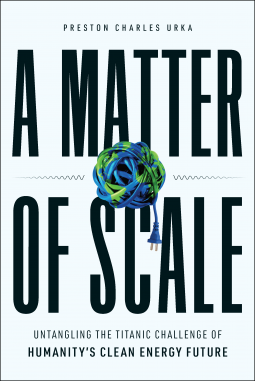
A Matter of Scale
Untangling the Titanic Challenge of Humanity's Clean Energy Future
by Preston Urka
This title was previously available on NetGalley and is now archived.
Send NetGalley books directly to your Kindle or Kindle app
1
To read on a Kindle or Kindle app, please add kindle@netgalley.com as an approved email address to receive files in your Amazon account. Click here for step-by-step instructions.
2
Also find your Kindle email address within your Amazon account, and enter it here.
Pub Date Apr 27 2021 | Archive Date May 31 2021
Greenleaf Book Group | River Grove Books
Talking about this book? Use #AMatterofScale #NetGalley. More hashtag tips!
Description
READ THIS BOOK AND HELP CREATE A BETTER FUTURE
Climate change affects us all. The manner in which we generate power globally—predominately burning high-carbon fuels—releases carbon dioxide and other greenhouse gases, worsening climate change, and we must do something to change that.
In A Matter of Scale, Preston Urka untangles the scope of electricity consumption on our planet, the technology choices, society's need for power, and most importantly the vast scale of electricity generation. This book will give you the tools you need to help you understand low-carbon possibilities and the solutions society must adopt—solutions you must advocate for—to achieve a clean energy future.
Featured Reviews
 C M, Reviewer
C M, Reviewer
In this book, Preston Urka attempts to first explain how energy is currently used on our planet; giving the reader some idea of how much energy is used, and what it is used for. Then Urka provides explanations of what other possibilities exist that might allow for generating power in the future, without relying so heavily on fossil fuels.
In the first sections of the book, Urka stresses the importance of scale, and tries to give the reader some idea of the huge numbers we are dealing with in terms of energy usage. He explains that humanity generated about 23.7 billion megawatt-hours of electricity in 2017. That is just electricity, which itself makes up only 20 – 25% of energy use. Urka also points out that residential heating uses much more energy than residential electricity does; and he wants the reader to think less about unplugging individual phone chargers and more about global solutions to cleaner energy production.
One thing that I found particularly interesting about this book, is that Urka's arguments do not entirely rely on climate change. Even if you don't care at all about humans affecting the climate, or aren't convinced that it is a serious problem, it still makes sense to come up with alternatives to fossil fuels, if for no other reason than the fact that it is a finite resource. Eventually the planet would simply not have any fossil fuels left if reliance on them continued unchecked. Putting the conversation in this context should make it so that everyone agrees that pursuing alternatives has some merit, regardless of what you think about climate change. Urka does mention greenhouse gas emissions and pollutants that arise from coal and natural gas power, but he refrains from arguing about climate change specifically. Hopefully this will allow his message to be received by a wider audience.
Urka explains many advanced energy concepts in language that is fairly easy to understand. Dispatchable power vs. intermittent energy; smart grid shifting, and redundancy are a few topics that Urka tackles early in the book. Hydro, geothermal, nuclear, wind and solar power options are all discussed; as well as policy changes and examples of countries that have tried different policies to attempt to prioritize low-carbon power generation.
There is quite a bit of information contained in this book, with many different charts and tables of data to support the text. Although Urka does a good job of explaining terms and using language that will make sense to most readers, some of the concepts are still fairly advanced, and it will take some time to absorb all of the information and data. So, not exactly a light or fast read, more of a reference guide that I will come back to when thinking about the future of energy solutions.







